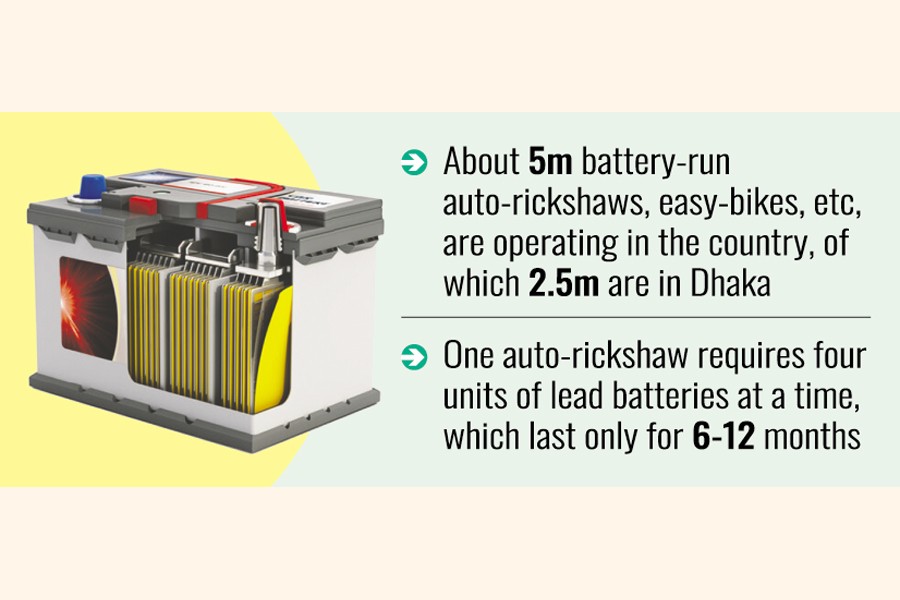
Published :
Updated :

Millions of used lead batteries are posing deadly threats to public health and environment amid the growing use of battery-run vehicles in the country over the years.
As these locally-made lead batteries are hardly reusable (one-time use only and cannot be fully recycled), millions of such batteries are ending up in an open environment.
Roads in the capital as well as in the country are now dominated by lead battery-run auto-rickshaws, easy-bikes and other such modes of transport. Even the highways and city flyovers are not free of these unscientific and unruly vehicles despite the government's restrictions.
These vehicles ultimately require a huge number of lead batteries. Lithium battery could be an alternative in this regard, but it remains an expensive option and unavailable in a large member, said experts.
In Dhaka city, informal battery recycling factories, being operated without proper regulation, are dominating the sector, said insiders.
According to the Battery-run Easy-bike and Rickshaw Drivers' Movement Council, about 2.5 million of auto-rickshaw, easy-bike and other such vehicles are being operated in the city, and their total number in the country is about 5.0 million.
One auto-rickshaw requires four units of lead batteries at a time to function, and these batteries last for 6-12 months depending on quality and prices. Prices of each four-unit package of batteries range from Tk 12,000 to Tk 35,000, according to shop owners and users.
"An additional one million auto-rickshaws and easy-bikes have been added after August last year," Roksana Afroz Ahasa, office secretary of Battery-run Easy-bike and Rickshaw Drivers' Movement Council, told the FE.
People in and around the city have joined the race of owning auto-rickshaws by taking the advantage of weak regulations on the city streets.
"About 2-2.5 million battery-run vehicles, including over 1-1.2 million auto-rickshaws, are plying in Dhaka city alone. A handful of businesses are controlling the sector, owning many auto-rickshaws against one name," she added.
Some 20 million lead batteries are currently being used in these vehicles in the country. Almost same number of batteries completed their life last year, and a similar number of batteries are expected to complete life this year, as these are not reusable or recyclable, based on the data provided by the organisation.
These batteries are made by local manufacturers, unofficially or informally operating in the city and other areas. They are not aware of the health effects of lead and acid used in the battery-making process. They do not even know how to manage those toxic materials that are enemy to the environment.
As battery recycling remains an informal sector, there is no concrete information or data available on how many recycling units are operating, and what is their total impact on environment and on people working in the factories, according to sector insiders.
"Therefore, the government must take certain initiatives to formalize the sector and set regulations to bring discipline in it to ensure compliance," Asha added.
Shahriar Hossain, secretary general of Environment and Social Development Organization (ESDO), an organisation closely working on the effect of lead battery, told the FE that the batteries used in auto-rickshaws and easy-bikes are one-time-use.
"Therefore, when these batteries complete their life, informal recyclers can collect up to 60 per cent of the lead used. But, they cannot collect the acid, and drain the acid to nearby water-bodies and sewerage lines."
The situation turns worse during the rainy season, as the acid (poured in sewerage lines or water-bodies) spreads to large areas, including agricultural land. It pollutes the water and fish as well as flora and fauna. Crops get seriously damaged due to acid pollution, and there is no remedy for it.
"The effect is long-lasting. The soil fertility gets damaged," he added.
Razinara Begum, director (waste and chemicals management) of Department of Environment, told the FE that the health risks of lead battery are immense, when exposed to environment. It has a direct effect on children, certainly to their central nerve system, brain, blood.
"We have found lead in blood samples of children where there are lead factories nearby."
The official noted that they are working to bring discipline by bringing the units into a formal sector.
The formal recycling and battery-making factories are running with complete compliance and handling only reusable and recyclable batteries. However, she admitted that those are low in number and informal factories are dominating the sector.
"We have some projects with specialized organisations, including UNICEF, to raise awareness and provide management knowledge."
The official noted that they run regular drives to shut illegal recycling facilities and lead battery-making factories across the country, particularly in the city.
nsrafsanju@gmail.com


 For all latest news, follow The Financial Express Google News channel.
For all latest news, follow The Financial Express Google News channel.